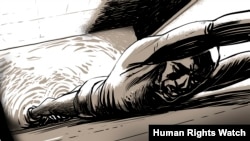Ethiopia’s Somali regional government has forcefully denied allegations of systemic torture at Jijiga Central Prison, setting the stage for a potential showdown with Prime Minister Abiy Ahmed.
The denial comes on the heels of an in-depth report from Human Rights Watch documenting the scope of torture at Jijiga, also known as Jail Ogaden, in the Somali regional capital.
“I have seen the report. It’s not true; it’s not based on facts,” Idris Ismail Abdi, the information minister for the Somali Region, told VOA’s Somali Service this week. “It’s not like they [HRW] came here and spoke to people. This is far from the truth, and it’s fabricated,” Abdi said.
The HRW report, based on interviews with 70 former prisoners, along with government officials, paints one of the most detailed pictures to date of the pervasive, and often depraved, use of torture in Ethiopian prisons.
Hours before HRW published its findings, Ethiopia’s attorney general, Berhanu Tsegaye, announced that prison heads in the country had been fired “for failing to discharge their responsibilities and respect prisoners’ human rights,” according to state-owned broadcaster Fana Television.
That move, and a historic admission last month by Ahmed that the government sanctioned torture in violation of its constitution, could lead to a political confrontation between the federal government and the powerful Somali regional leaders.
‘Absolutely no rule of law’
According to HRW, officials have detained thousands of prisoners at Jail Ogaden, most of whom experience routine abuse and neglect. Many of the prisoners have never been convicted of or even charged with a crime, HRW said.
Officials believe that the prisoners either belong to or sympathize with the Ogaden National Liberation Front (ONLF), a prominent opposition group. ONLF has, in years past, fought the Ethiopian Defense Forces, and both groups committed war crimes in 2007 and 2008, according to HRW.
On Thursday, the Ethiopian parliament removed ONLF and two other opposition groups from a list of terrorist organizations.
Felix Horne is a senior researcher in HRW’s Africa division and wrote the report on Jail Ogaden. He told VOA that, although government torture has been widespread in Ethiopia, the Somali region is unique in its lawlessness.
“There is absolutely no rule of law,” Horne said. “Of 70 former detainees we interviewed, only four had ever been to court. And the individuals who are responsible for abuse in Jail Ogaden, and responsible for bigger and broader abuses in the Somali region, are all the way to the highest level.”
Horne said that the only way forward is for the prime minister to step in with a federal commission to provide oversight and investigate abuses. That’s within Ahmed’s authority, Horne said, and a necessary step to create lasting change.
But it would likely put Ahmed at odds with Abdi Mohamoud Omar, the Somali regional president.
Omar, also known as Abdi Illey, oversees the Liyu police, a special force responsible for a range of abuses against Ethiopians, particularly in the Somali region, according to human rights groups.
Regional ‘warlord’
Hallelujah Lulie is a security researcher and political analyst at Amani Africa. The Liyu police function as a regional army, Lulie told VOA, and they were established to contain the ONLF, which has posed a longstanding political threat to Abdi Illey’s party.
Lulie said that HRW’s findings are not surprising, but the extent of abuses exposed by the report is noteworthy.
Dislodging Abdi Illey from power, however, might not be so easy.
“His power is unchecked,” Lulie said. “He’s been running the region as a warlord, that I can say for sure,” Lulie added. “He has total control over … the security institutions, the legislative units, all orders of regional government.”
Lulie recalled one instance in which six or seven members of Abdi Illey’s cabinet rebelled against him and traveled to Addis Ababa, the capital. Abdi Illey followed them there and hijacked them back to Jijiga, Lulie said.
But Horne sees limits to Abdi Illey’s authority. Upcoming elections in 2020 would provide one way to remove him from power, and his authority ultimately stems from the federal government.
“Abdi Illey has overseen various abuses. He’s responsible for the Liyu Police, who engaged in many massacres, some of which have been documented by human rights groups. And he can be prosecuted under Ethiopian law for that,” Horne said.
In the short term, Horne said, accountability must improve.
“One thing that was pretty evident from this research is that there is grossly inadequate oversight of regional detention facilities. And that needs to change,” Horne said.
Jamal Osman and Harun Maruf in VOA’s Somali Service contributed to this report.





